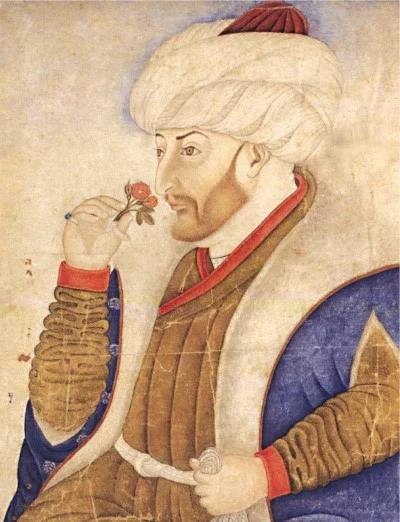Ottoman Rose

Rose water and rose products, such as rose confection and syrups were used in abundance by the Ottoman Empire during all periods in the Ottoman history. In the Ottoman tradition, “offering rose water” was a precious treat; the custom was practiced not only in the palaces, but in the most modest houses as well. Rose was planted by the ferman (order) of the Sultans to ensure is a continuous supply of rose water and rose oil for use by the Palace.
Sultans and Roses
In 1587, Sultan Murad III issued an order “on the transfer of roses required for the Imperial Gardens, from Edirne,”. Additional evidence suggests fragrant roses were cultivated in the Imperial Gardens, and, during spring palace attendants picked the roses to prepare rose confections. By the order of the Sultans the rose plant was spread across the entirety of the Ottoman empire. Sultan Abdulhamit encouraged rose cultivation in Ottoman lands by providing rose saplings and stills to farmers in Istanbul and numerous other areas of Turkey and Syria. Eventually, Isparta and Burdur provinces proved to be most suitable for rose cultivation and oil production.
Full Bloom
The time when roses are in full bloom is called doruk [peak time]. During doruk, sometimes the rose cauldrons boil nonstop for four days and four nights and the workers sleep in shifts. When the roses are boiling, the nights are festive.
A mature rose field normally yields 5 tons of fresh roses per hectare, but a carefully nurtured field may increase yield to 7-to-8 tons per hectare. It is normal for a field to be productive for as long as 20 to 30 years. Rose harvest lasts for approximately one month between mid-May and mid-June.
Distillation
In traditional style distillation, freshly picked flowers are loaded into copper or galvanized steel open fire stills; most stills have a 300-liter capacity and consist of a retort and a head. The removable spherical head is connected to a pipe which leads through a pool filled with lukewarm water to cool the condensate. At the outlet, there is a 9-liter glass collecting flask. Typically, 10 kg of flowers and 60 litres of water are loaded into 300-liter stills and are distilled for 1 to 2 hours in order to collect 2 flasks full of the distillate (18 litres). The oil does not separate due to the low concentration of oil in the distillate. Therefore, about 60 litres of the distillate are redistilled, yielding another 18 litres of distillate from which the oil that floats to the top is decanted. The aqueous phase is diluted with distilled water and marketed as rose water.